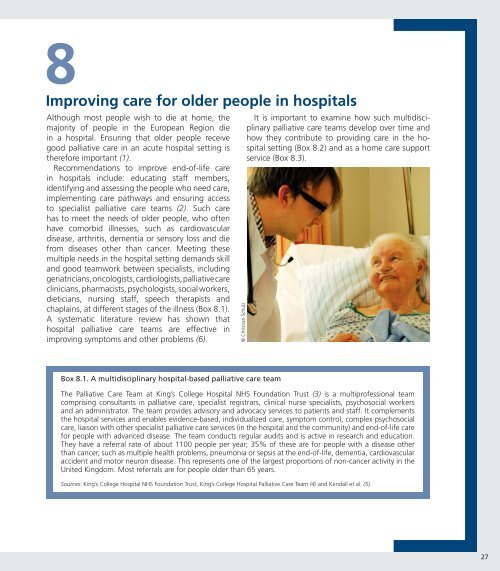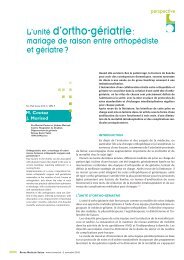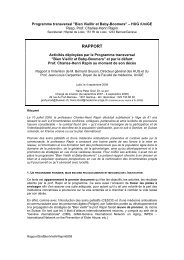Palliative care for older people - World Health Organization ...
Palliative care for older people - World Health Organization ...
Palliative care for older people - World Health Organization ...
Create successful ePaper yourself
Turn your PDF publications into a flip-book with our unique Google optimized e-Paper software.
8Improving <strong>care</strong> <strong>for</strong> <strong>older</strong> <strong>people</strong> in hospitalsAlthough most <strong>people</strong> wish to die at home, themajority of <strong>people</strong> in the European Region diein a hospital. Ensuring that <strong>older</strong> <strong>people</strong> receivegood palliative <strong>care</strong> in an acute hospital setting isthere<strong>for</strong>e important (1).Recommendations to improve end-of-life <strong>care</strong>in hospitals include: educating staff members,identifying and assessing the <strong>people</strong> who need <strong>care</strong>,implementing <strong>care</strong> pathways and ensuring accessto specialist palliative <strong>care</strong> teams (2). Such <strong>care</strong>has to meet the needs of <strong>older</strong> <strong>people</strong>, who oftenhave comorbid illnesses, such as cardiovasculardisease, arthritis, dementia or sensory loss and diefrom diseases other than cancer. Meeting thesemultiple needs in the hospital setting demands skilland good teamwork between specialists, includinggeriatricians, oncologists, cardiologists, palliative <strong>care</strong>clinicians, pharmacists, psychologists, social workers,dieticians, nursing staff, speech therapists andchaplains, at different stages of the illness (Box 8.1).A systematic literature review has shown thathospital palliative <strong>care</strong> teams are effective inimproving symptoms and other problems (6).© Christian SchulzIt is important to examine how such multidisciplinarypalliative <strong>care</strong> teams develop over time andhow they contribute to providing <strong>care</strong> in the hospitalsetting (Box 8.2) and as a home <strong>care</strong> supportservice (Box 8.3).Box 8.1. A multidisciplinary hospital-based palliative <strong>care</strong> teamThe <strong>Palliative</strong> Care Team at King’s College Hospital NHS Foundation Trust (3) is a multiprofessional teamcomprising consultants in palliative <strong>care</strong>, specialist registrars, clinical nurse specialists, psychosocial workersand an administrator. The team provides advisory and advocacy services to patients and staff. It complementsthe hospital services and enables evidence-based, individualized <strong>care</strong>, symptom control, complex psychosocial<strong>care</strong>, liaison with other specialist palliative <strong>care</strong> services (in the hospital and the community) and end-of-life <strong>care</strong><strong>for</strong> <strong>people</strong> with advanced disease. The team conducts regular audits and is active in research and education.They have a referral rate of about 1100 <strong>people</strong> per year; 35% of these are <strong>for</strong> <strong>people</strong> with a disease otherthan cancer, such as multiple health problems, pneumonia or sepsis at the end-of-life, dementia, cardiovascularaccident and motor neuron disease. This represents one of the largest proportions of non-cancer activity in theUnited Kingdom. Most referrals are <strong>for</strong> <strong>people</strong> <strong>older</strong> than 65 years.Sources: King’s College Hospital NHS Foundation Trust, King’s College Hospital <strong>Palliative</strong> Care Team (4) and Kendall et al. (5).27
















